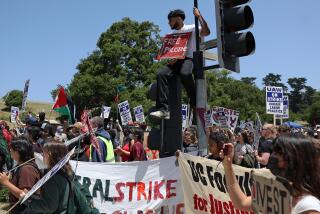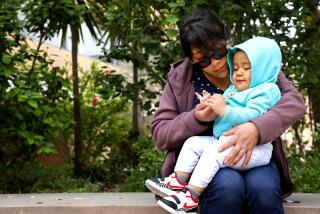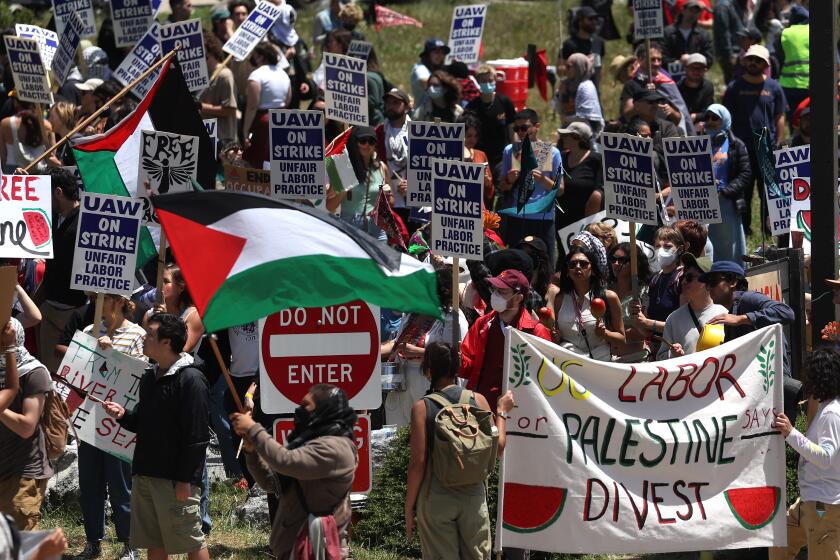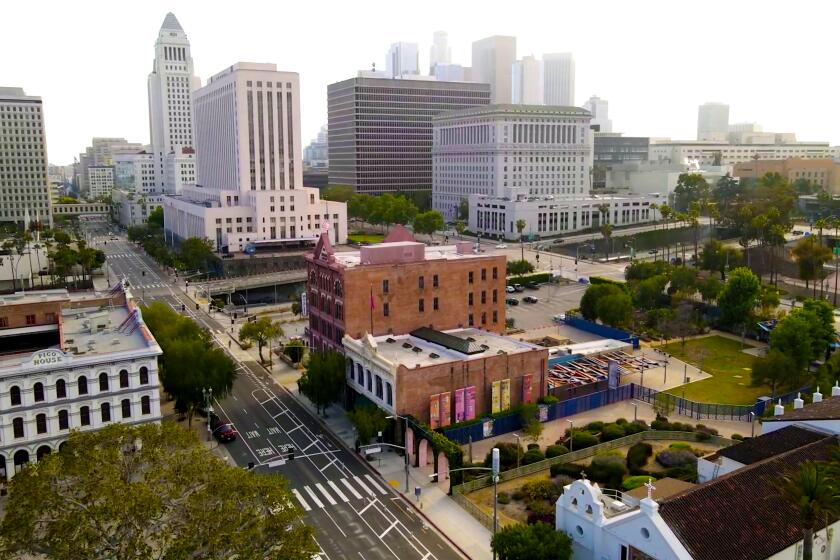Canyon Dwellers Feel Boxed In by Zoning Deal
In this equestrian-oriented community in the shadow of the Verdugo Hills, folks grow their own vegetables and raise pigs, goats and chickens only a few yards from their back porch.
Most teenagers here learn to ride a horse on nearby mountain trails before they learn to drive a car.
“It’s really an awesome place to live,” said seven-year resident Joe Dvoracek. “It’s like this little utopia.”
But residents see their idyllic lifestyle threatened by a proposed 34-home development that will require grading and blasting of 39 acres of a green, pristine canyon.
What angers neighbors the most is that a project of this size would be illegal under current hillside zoning laws. Instead, the project may be approved under a 1993 lawsuit settlement reached between the city of Los Angeles and the developer over a zoning dispute.
Some neighbors call the settlement a “dirty, back-room deal.” Lawyers for the developer blame the messy dispute on the city’s protracted approval process.
The Los Angeles City Council wades into this hornet’s nest today to decide the fate of this controversial project.
But lawyers for the city and the developer say the council may have little choice but to approve the project. They argue that if the council rejects the project and backs out of the settlement, the developer could build even more homes under a permit approved prior to the settlement.
“They can’t back out of the settlement because that was done years ago,” said Gary Hanken, an attorney for the landowner and developer, Flora Yeh.
Part of the problem, said Hanken, is that the city has prolonged final approval of the project, giving neighbors in the community time to raise new objections and an opportunity for the city to change zoning laws.
“Because the wheels grind relatively slowly in this procedure, the views on this keep changing,” he said. “The rules and attitudes keep changing.”
The contentious history of the project began in 1985 when a 50-home development on 52 acres north of La Tuna Canyon Road was approved by the city’s advisory agency, a panel of several department representatives that decides zoning issues.
Zoning laws at the time allowed for such a development and no one--including neighbors or the late Councilman Howard Finn--appealed the decision to the city’s Planning Commission or City Council.
In 1990, a state law forced the city to reassess all of its zoning laws to ensure that they were consistent with neighborhood planning documents. After reviewing the zoning codes, the city rezoned the 52-acre site, changing it to a classification that would allow fewer than 10 houses on the property.
The developer of the property sued, claiming that the city could not change the zoning on a project that had already been approved.
To avoid a lengthy legal dispute, the developer and the city reached a settlement in 1993. The developer agreed to scale down the 50-home project to 34 homes and the city agreed to “initiate and consider” the 34-home project.
But under the settlement, if the council rejects the 34-home proposal, the developer can proceed with construction of the 50-home project.
No public hearing or council reviews would be required for the 50-home project, which would proceed based on the 1985 approval.
Jerry Neuman, a land-use attorney representing several neighbors, conceded that the settlement doesn’t give the council many options. But he said that he is considering challenging the legality of the settlement.
“I think the city went beyond its authority to sign that settlement,” he said.
Still, Neuman said the development may be beyond challenge.
“It is an uphill battle and I think in the end the city attorney will tell the council that their hands are tied,” he said.
Councilman Joel Wachs, who has represented the La Tuna Canyon area since 1986, is opposed to the hillside development and has asked the city lawyers to study the settlement to see what options are left for the council.
“I want to restrict it as much as possible,” Wachs said. “But the lawyers keep saying that if we don’t give them the 34 [homes] they get the 50 [homes].”
He said some neighbors have suggested that the council reject the 34-home project because they don’t think the developer can afford to build the 50-home project.
“Some people in the community say let’s roll the dice,” he said. “I don’t know.”
The project has become an emotional issue among La Tuna Canyon residents who see it as part of a pattern of encroachment by Los Angeles’ urban sprawl.
A recent city planning report said a total of 151 new homes are now in the process of being built on 130 acres in the community.
The site of the much-disputed project is in a small canyon off Ledge Avenue north of La Tuna Canyon Road. An olive grove currently occupies the canyon. Horse trails snake around the grove and up green, rolling hillsides. Rabbits and deer are often seen scampering through the canyon.
Dozens of neighbors have signed petitions protesting construction of the project.
One of those neighbors, Sharon Bryant, lives with her family just two doors away from the project site in a home with a big backyard where her daughter raises goats for her 4-H club.
Bryant has lived in the home for seven years and fears the development will ruin the rural atmosphere of the neighborhood.
“I prefer the low density,” Bryant said. “Most people around here keep animals.”
Dvoracek, who lives in the house adjacent to the project site, said most neighbors are disappointed in the way the city has handled the project.
He called the lawsuit settlement “a dirty deal” and charges that the city “totally sold us down the river.”
“I can understand that the developer wants to make money, that is the American way,” he said, “but the problem is that our canyon is unique.”
More to Read
Start your day right
Sign up for Essential California for news, features and recommendations from the L.A. Times and beyond in your inbox six days a week.
You may occasionally receive promotional content from the Los Angeles Times.







